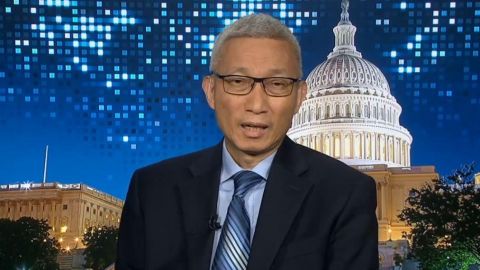Read Transcript EXPAND
CHRISTIANE AMANPOUR: Can you explain how this offer will be funded?
ANDY SLAVITT, FORMER ADMINISTRATOR, CENTERS FOR MEDICARE & MEDICAID SERVICES: Sure. Well, the juxtaposition of health care and taxes is a really, I think, fascinating topic in the U.S. right now. In some part, what we saw in 2018, in the midterm elections in the U.S. was health care superseded taxes as a more important issue, because for many Americans, the impact of the affordability of health care has a greater impact on their pocketbook and their bottom line than what their marginal tax rate is. And we saw people fundamentally saying that if they can’t afford to take care of their families, if someone gets sick, they really can no longer stay in the middle class. And so, health care protection, in many ways, is a safety net underneath them and it’s a ticket to the middle class. And so, when the policies of taking away coverage for pre-existing conditions and so forth came to light, that turned out to be much more important than the tax rates were. So, each of these plans, I think, has — is really competing less today on how they’re going to pay for itself than on, are they going to fundamentally provide that level of security? Now, some of the plans that are more ambitious like Sanders’ plan has a bigger ticket and a bigger number, and he has proposed taxes that would go all the way into the middle class and believes that that’s a trade-off that Americans would handle. There’s obviously a lot of candidates who believe that’s not necessarily. And it’s really less, I think, driven by the concern over raising taxes than it is over what to do with the 150 million plus Americans that do get their coverage through their employer. Their employer pays 70 percent of that benefit. And they’re really loathe to trade something that they have, even if they don’t love it, for something that is unknown. That what we have to deal with is that many of the new jobs in our economy in the U.S. today don’t come with health benefits. So, it’s not just an answer to just stay as it is, but we have to figure out how to do this in a way that Americans find palatable.
AMANPOUR: OK. So, that’s interesting. And I’m going to throw this soundbite from one of the debates this — from Tim Ryan, congressman from the manufacturing belt about the whole idea of employer-funded insurance and, of course, the union workers who did make a trade and who like their insurance.
(BEGIN VIDEO CLIP)
REP. TIM RYAN (D-OH), PRESIDENTIAL CANDIDATE: Here we are in Detroit, home of the united auto workers. We have all of our union friends here tonight. This plan that’s being offered by Senator Warren and Senator Sanders will tell those union members who gave away wages in order to get good health care that they’re going to lose their health care because Washington is going to come in and tell them they have a better plan.
(END VIDEO CLIP)
AMANPOUR: Sarah, does he have a point?
SARAH KLIFF, NEW YORK TIMES INVESTIGATIVE REPORTER: Yes. I think this is one of the key questions that will come up in the debate.
About This Episode EXPAND
Christiane Amanpour speaks with Andy Slavitt and Sarah Kliff about the role of healthcare in the 2020 race. Minxin Pei joins the program to discuss negotiations between the U.S. and China. Hari Sreenivasan sits down with Kwame Onwuachi, author of “Notes from a Young Black Chef,” to discuss how he beat all odds to become part of a new wave of cooking trailblazers.
LEARN MORE


